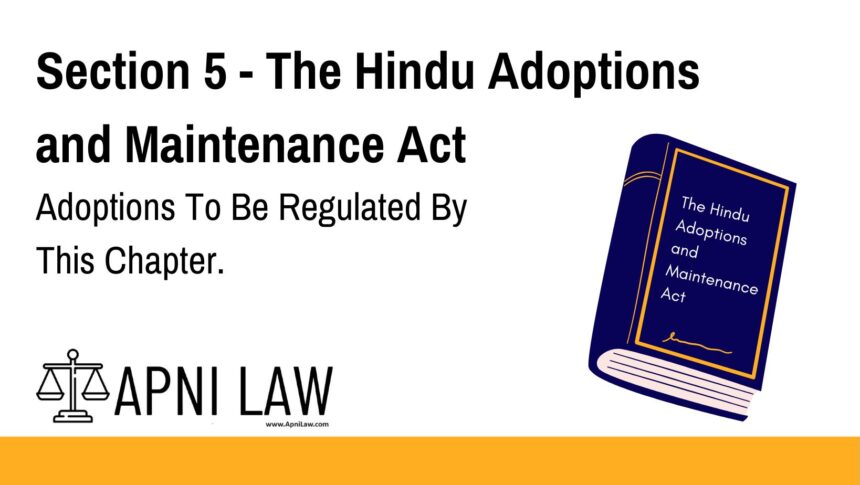Code: Section 5 – Adoptions to Be Regulated by This Chapter
(1) No adoption shall be made after the commencement of this Act by or to a Hindu except in accordance with the provisions contained in this Chapter, and any adoption made in contravention of the said provisions shall be void.
(2) An adoption which is void shall neither create any rights in the adoptive family in favour of any person which he or she could not have acquired except by reason of the adoption, nor destroy the rights of any person in the family of his or her birth.
Explanation of Section 5 – Adoptions to Be Regulated by This Chapter
Section 5 establishes that all adoptions among Hindus must strictly comply with the conditions laid down in the Hindu Adoptions and Maintenance Act, 1956. It sets the legal framework for valid adoptions and clearly defines the consequences of non-compliance.
Key Points:
1. Adoption Must Follow Legal Provisions
- Any adoption conducted by or to a Hindu after the commencement of this Act must be in line with the provisions outlined in Chapter II of the Act.
- Non-compliance results in the adoption being declared void.
2. Legal Consequences of Void Adoption
- A void adoption creates no legal rights in the adoptive family for the adopted person.
- It does not affect the rights the person already had in their biological family.
3. Purpose
- This section aims to prevent misuse of adoption practices and to ensure uniformity, legality, and protection of rights for all parties involved.
Illustration
Example 1: Invalid Adoption Procedure
A Hindu couple adopts a child without fulfilling the necessary legal requirements under Chapter II—such as the age, gender, or consent conditions. That adoption is void under Section 5(1), meaning it has no legal effect.
Example 2: Effect of a Void Adoption
Suppose a void adoption takes place and the adopted child later claims inheritance in the adoptive family. Under Section 5(2), that claim will fail because the adoption conferred no legal rights. Similarly, the child will still retain inheritance rights in their biological family.
Common Questions and Answers
1. What happens if an adoption does not follow the Act’s provisions?
It is deemed void. The person cannot claim any rights in the adoptive family nor lose rights in their birth family.
2. Can a void adoption be later validated?
No. Once declared void due to non-compliance, the adoption has no legal standing and cannot be validated retroactively.
3. Does the Act apply to all Hindus uniformly?
Yes. All adoptions involving Hindus after the commencement of this Act must comply with its provisions.
4. What is the impact on inheritance in a void adoption?
A person adopted through a void adoption cannot inherit property from the adoptive family but retains all inheritance rights in their biological family.
Conclusion
Section 5 of the Hindu Adoptions and Maintenance Act, 1956 reinforces the legal sanctity and structure of Hindu adoptions. It mandates that every adoption must be carried out strictly under the rules of the Act. Any deviation renders the adoption void—ensuring both the protection of rights and the prevention of fraudulent or improper adoptions.
To explore further sections and understand how to legally adopt under Hindu law, visit ApniLaw.








